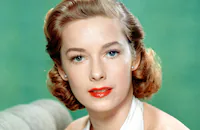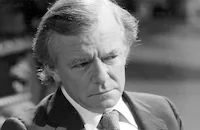A Touch of Larceny

Brief Synopsis
Cast & Crew
Guy Hamilton
James Mason
Vera Miles
George Sanders
Harry Andrews
Robert Flemyng
Film Details
Technical Specs

Synopsis
In London, Commander Max "Rammer" Easton trades on his reputation as a war hero to retire to a life of ease and philandering. His job at the Admiralty affords him plenty of time to pursue his real loves, dallying with women and playing squash with his coworker, Larkin. In the locker room after a game, Max meets Sir Charles Holland, a fellow naval veteran who offers him a ride home. In the car, Max is stunned at the sight of Charles' lovely passenger, American Mrs. Virginia Killain, and surreptitiously steals her glove so he will have an excuse to see her again. Although Virginia is aware of his machinations, he so charmingly manipulates the situation that she is forced to invite him to her flat, where he learns that Charles is away on business for ten days. It is only after Max, eager to win her favor, refers to Charles as "dull" that Virginia reveals that she is engaged to Charles and asks Max to leave. Just then, however, Charles' friends the Parrishes arrive, and when they cannot decide which restaurant to visit, Max uses the opportunity to invite himself along to dine at a little-known club. Although she assiduously resists his advances, Virginia is intrigued by the charming officer, and allows the Parrishes to convince her to join him the next day for lunch aboard his ship. When they reach the docks, Virginia is exasperated to see that the "ship" is his small sailboat, but agrees to take a day trip. There, Max presses Virginia to admit that she is marrying Charles for financial security. Speculating as to how to make enough money for her to marry him instead, Max proposes that he could hide a secret file at the Admiralty, then disappear while on vacation to his favorite little island in Scotland, and after the press brands him a traitor, he could return and sue for defamation of character. Virginia enjoys the banter, but still considers Max a rake, and so when, while dancing that evening, she finds herself falling in love with him, she pulls away. Before dropping her off, he proposes, but she asks him not to call her again. Besotted, Max immediately puts his plan into action, first pretending to be drunk at the Admiralty reception for the USSR ambassadors and ensuring that his coworkers see him engaging in a spirited, private discussion with a Russian officer. Then, after arranging a vacation in Scotland, he sells his car, leaves a note proclaiming "I have no choice," and drops a top-secret file behind a cabinet in his office. Upon sailing his boat to Liverpool, Max deliberately attracts the attention of the dock guards by asking about the Russian ship nearby, then finally sails off to the Skerries, a secluded isle on which he unloads weeks' worth of lavish provisions. While Max enjoys a luxurious holiday, Charles, a newly named ambassador, takes Virginia to Scotland to meet his family, and on the train, she laughingly conveys Max's get-rich-quick scheme. Max overstays his allotted vacation time and soon, his carefully constructed "clues" are collected by the police. Although the evidence is circumstantial, when the file is discovered missing, the Admiralty must agree with the police that Max appears to have joined the Russians. As the press picks up on the story and begins rampant coverage of Max's life and actions, Max waits patiently on his island to hear them call him a traitor, at which point he can pack up and return to London to clear his name. Meanwhile, in Scotland, Charles and Virginia realize that Max is carrying out his ploy, but Charles, afraid of becoming involved in a scandal, agrees to Virginia's pleas not to report Max. Finally, Max hears himself branded a traitor, then tosses all of his provisions, except the fuel to light the signal beacon, into the ocean. On his way to light the beacon, however, he falls into the water, losing the fuel, and finds himself truly marooned. He waits for days until suddenly a police boat cruises by and rescues him. Sure that his ruse has been discovered, Max is repentant until he learns that the police found an S.O.S. message signed by him in a bottle. Realizing that Virginia, the only person who knew his whereabouts, has saved him, he continues his plan, manipulating his superior, Capt. Graham, into "convincing" the diffident Max to sue the press. When Charles hears that Max plans to sue, however, he leaves Virginia to visit military intelligence and clandestinely inform the inspectors that Max set up the whole incident. At the Admiralty, Max believes that he has succeeded without a hitch, when Graham calls him in to meet the inspector, who accuses him of having an accomplice. Max denies this, prompting the inspector to ask him to describe the bottle and the note. After faltering briefly, Max replies that he sent so many bottles that he cannot recall them all. With no options, the frustrated inspector congratulates Max and leaves. Max goes straight to Virginia's flat, where she tries to throw him out. Charles arrives, but after he announces that he has arranged to have Max arrested, a horrified Virginia asks him to leave, and he gracefully acknowledges that Max has won her heart. Virginia still rebuffs Max until he agrees not to sue the papers, but instead decides to sell his "true" story to the highest bidder, thus earning enough money to take care of his new wife. Exasperated but bewitched, Virginia cannot help but laugh, after which Max takes her in his arms.

Director

Guy Hamilton
Cast

James Mason

Vera Miles

George Sanders

Harry Andrews
Robert Flemyng
Ernest Clark
Duncan Lamont
Percy Herbert
Oliver Johnston
William Kendall

Peter Barkworth
Rachel Gurney

Martin Stephens
Waveney Lee

Charles Carson
Junia Crawford
Reginald Smith
Rosemary Dorken
Macdonald Parke
Mavis Villiers
John Le Mesurier
Lionel Murton
Guy Kingsley Poynter
Sidney Vivian
Harry Locke
Gordon Harris
Jimmy Lloyd
Barbara Hicks
William Mervyn
Alexander Archdale
Roger Maxwell
Henry Longhurst
Gerald Case
Donald Bisset
Desmond Roberts
Stanley Zevic
Andre Mikhelson
Richard Marner
Crew
John Bramall
Jimmy Campbell
Hoagy Carmichael
Reg Connelly
Pamela Davies
Austin Dempster
Ivan Foxwell
Ivan Foxwell
Antony Gibbs
Philip Green
Guy Hamilton
Edith Head
Roger Macdougall
Alan Osbiston
Prager
Elliot Scott
Joan Smallwood
Sydney Streeter
Ned Washington
John Wilcox
Fred Williamson
Harry Woods
Peter Yates

Film Details
Technical Specs

Articles
A Touch of Larceny
Following a lucrative film career in England during the 1930s and 40s, British star James Mason had spent the 1950s in Hollywood establishing himself as one of the world's most distinguished actors. However, by the end of the decade, Mason was growing restless. Producer Ivan Foxwell described him at that point as being "terribly disillusioned by California and desperate to get back to Europe." When Foxwell approached Mason about making A Touch of Larceny on location in the UK, he jumped at the opportunity.
This change of pace also presented an opportunity for Mason to display his hidden comedic chops. Mason's career had been built on heavy dramatic roles, but Foxwell saw potential for something fresh and new. "In California soon after the war I'd seen James taking part in amateur theatricals, playing in Victorian melodramas just for friends," said Foxwell according to the 1989 biography James Mason: Odd Man Out by Sheridan Morley, "and I suddenly realized what a marvelous light comedian he would be. The studio wanted me to get [David] Niven for A Touch of Larceny, and he would have been the more commercial casting, but I knew that James could deliver something altogether more interesting and detailed."
Following the release of A Touch of Larceny, James Mason received strong reviews. The British Evening Standard wrote, "Mason's performance, bland and wryly humorous, pursues its objectives with the tenacity of a homing torpedo; his portrayal indicates that we may see more of Mason sweet rather than sour, and without recourse to either bedroom or deadpan humor, the film restores to British screen comedy something that has been missing since Ealing days." The New York Times said, "James Mason gives the role of the rakish commander the necessary light touches as he strews red herrings across the paths of the befuddled newspapers and the Navy."
Audiences will thoroughly enjoy getting onboard this madcap adventure and watching the playful chemistry between Mason and Vera Miles. Directed by Guy Hamilton, who would go on to direct the James Bond films Goldfinger (1964), Diamonds Are Forever (1971), Live and Let Die (1973) and The Man with the Golden Gun (1974), the clever plot twists will delight viewers and keep them guessing until the very end.
By Andrea Passafiume

A Touch of Larceny
Quotes
Trivia
Notes
In January 1959, Los Angeles Times reported that producer Ivan Foxwell was arranging with Paramount to distribute A Touch of Larceny. Information in the file on the film in the MPAA/PCA collection at the AMPAS Library indicates that Paramount had a pre-production financial investment in the film. The film was shot in March and April 1959 on location in London, Southampton, and on Dubh Sgeir, an island in Scotland's Firth of Lorne, as well as at the Metro-Goldwyn-Mayer Studios in Elstree, England, according to press notes. According to a modern source, the studio wanted David Niven to play the lead, but Foxwell insisted on Mason.

Miscellaneous Notes
Released in United States Winter January 1960
Released in United States Winter January 1960













